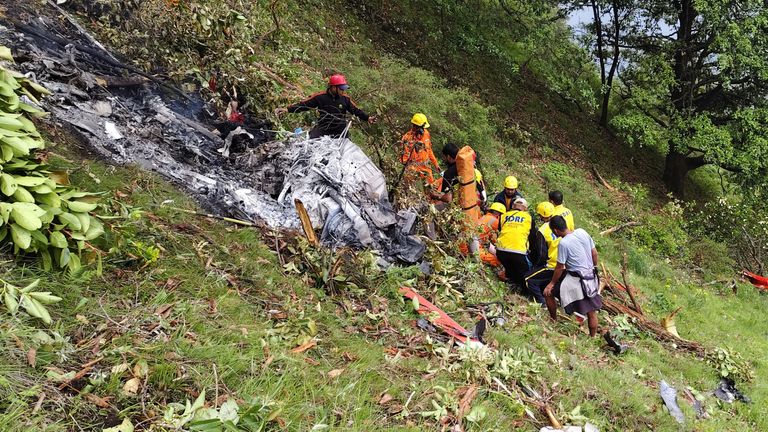Articles in this Cluster
16-06-2025
Iranians describe feeling “stuck” and unsafe amid Israel’s largest strikes on Iran in years, with panic-driven petrol queues, traffic jams, and attempts to flee Tehran without official warnings or air-raid sirens. Residents report sleepless nights, trauma reminiscent of the Iran-Iraq war, unstable internet, and confusion over how to stay safe, especially after residential buildings were hit. Many feel unable to leave due to family or work obligations and uncertainty about targets, while messages from Israel urging Iranians to avoid military sites and calls by PM Netanyahu to rise up have found little traction. Iranian media report over 120 killed in Iran; at least 10 have been killed in Israel as exchanges continue.
Entities: Iran, Israel, Tehran, Benjamin Netanyahu, Iran-Iraq War • Tone: urgent • Sentiment: negative • Intent: inform
16-06-2025
The State Department alerted several Middle East allies ahead of Israel’s strikes on Iran, emphasizing the U.S. was not involved militarily and preferred diplomacy. Secretary of State Marco Rubio personally made the calls, signaling Washington’s effort to distance itself and mitigate risks to regional partners hosting U.S. forces. Israel said it targeted Iranian nuclear facilities and officials; Iran retaliated with missiles and drones, injuring over 20 in Israel. The U.S. helped intercept Iranian attacks but maintained it wasn’t part of Israel’s operation. The flare-up threatened planned U.S.-Iran nuclear talks and heightened regional fears of a wider war and potential nuclear fallout, especially for nearby Arab states.
Entities: United States, Israel, Iran, State Department, Marco Rubio • Tone: analytical • Sentiment: negative • Intent: inform
16-06-2025
Israel’s airstrikes on Iran sparked a global risk-off move: stocks fell, travel shares slid, and investors shifted into safe havens like the U.S. dollar and gold. Oil prices surged on fears of Iranian supply disruptions. Despite heightened volatility, U.S. markets showed resilience, with attention also turning to the upcoming Federal Reserve meeting. The conflict appears early in an escalation cycle, warranting caution. Separately, Boeing’s outlook at the Paris Air Show dimmed after a fatal 787-9 crash led its CEO to cancel attendance.
Entities: Israel, Iran, U.S. dollar, gold, oil prices • Tone: analytical • Sentiment: negative • Intent: inform
16-06-2025
U.S. stock futures edged higher early Monday after a sharp sell-off Friday, as escalating Israel-Iran conflict lifted oil and gold. WTI hovered around $74 after a 3% jump Sunday and a 7% surge Friday, with Brent also rising, amid strikes on Iranian energy sites and threats to the Strait of Hormuz. The Dow, S&P 500, and Nasdaq all ended last week lower. Investors await Monday manufacturing data and Wednesday’s Fed decision, with markets pricing in no rate change; higher oil reduces odds of a cut despite political pressure. Analysts warn of heightened regional escalation risk depending on major-power involvement.
Entities: U.S. stock futures, WTI crude, Brent crude, Federal Reserve, Dow Jones • Tone: analytical • Sentiment: neutral • Intent: inform
16-06-2025
Iran has arrested dozens of people across the country on accusations of spying for Israel and promoting “pro-Zionist” content online following Israeli strikes and revelations that Mossad smuggled weapons into Iran to aid internal attacks. Authorities have urged citizens to report suspicious behavior—such as people wearing masks, hats, and sunglasses at odd hours, frequent courier deliveries, or unusual noises—and increased street surveillance with Basij patrols. A previously detained suspect was executed, and officials vowed swift prosecutions. Israeli officials claim Mossad established an internal base to launch drone attacks on Iranian missile systems, enabling large-scale airstrikes and targeting of senior figures. Iranian media say authorities seized explosives, drones, and manufacturing equipment linked to the operation.
Entities: Iran, Mossad, Israel, Basij, Israeli airstrikes • Tone: urgent • Sentiment: negative • Intent: inform
16-06-2025
As Israel-Iran tensions escalate, Gazans fear their humanitarian crisis is being overshadowed. The strip faces worsening hunger and devastation, with over 55,300 killed and 128,700 injured since October 2023. Despite a partial easing of Israel’s blockade, aid remains severely restricted, with key supplies still blocked and distribution points situated in active combat zones leading to further deaths. International pressure on Israel has recently grown but may wane as regional conflict intensifies. Personal accounts highlight starvation, soaring prices, and deadly risks in seeking food, reinforcing a sense that “the world has forgotten” Gaza.
Entities: Gaza, Israel, Iran, humanitarian crisis, blockade • Tone: analytical • Sentiment: negative • Intent: inform
16-06-2025
Israel struck Iranian energy infrastructure, including the South Pars gas field shared with Qatar, escalating tensions with Iran and raising risks for global energy security. Analyst Firas Maksad told CNN the attacks could disrupt gas supplies, roil energy markets, and heighten regional instability, with potential spillover effects on oil and LNG flows and prices.
Entities: Israel, Iran, South Pars gas field, Qatar, Firas Maksad • Tone: analytical • Sentiment: negative • Intent: inform
16-06-2025
Israel intensified its fourth day of strikes across Iran, hitting the Quds Force’s Tehran command center and the state broadcaster, which briefly went off air after an on-air explosion injured staff and disabled its website. The expanded campaign, targeting military, nuclear, energy, and media sites, follows Iranian missile barrages that Israel says largely were intercepted, though a strike damaged an Israeli apartment tower, killing four. Iran reports at least 224 dead and 1,400 injured; Israel reports at least 24 civilian deaths and about 600 injured. Tehran saw mass flight attempts, fuel shortages, and communications disruptions, with Israel ordering evacuations in parts of northern Tehran before bombing. Netanyahu suggested the strikes could even topple Iran’s government; Iran’s president said the attacks halted nuclear talks. The IAEA said Israeli strikes likely cut power to centrifuges at Iran’s main enrichment plant. Trump urged negotiations while stressing Iran must not obtain a nuclear weapon. Israel’s airspace remains closed, with limited airlifts planned.
Entities: Israel, Iran, Quds Force, Tehran, Iranian state broadcaster • Tone: urgent • Sentiment: negative • Intent: inform
